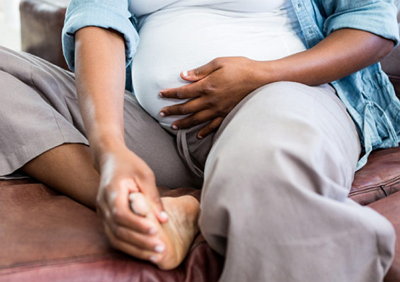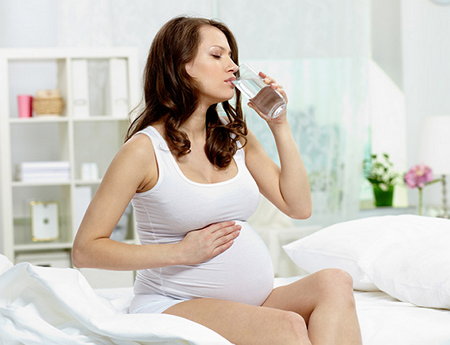Swelling During Pregnancy

Contents:
Changing conditions of woman's organism during pregnancy apply to the whole body including internal organs and systems. As a result there are may be some problems with health, as it is not so easy to withstand increased loads as it appears at first sight. One of the most widespread complications during pregnancy are edemas and swelling. Any pregnant woman has them, but always for various reasons. Therefore treatment has to differ in each individual case.
Causes for Swelling
During pregnancy, water demands for woman’s organism increase. This arises from the fact that the organism needs large volume of blood. The amount of amniotic waters also gradually increases that leads to necessity of decrease in viscosity of blood. Hormones of pregnancy make the woman thirsty, and she begins to drink more water. It leads to the fact that almost each pregnant woman has leg edema. Such swellings are a normal state, but require attention from the doctor anyway.
Swelling occurs because of the following reasons:
- "Normal" swelling (occurs because of increased shortage of liquid).
- A varicosity (leg edema during pregnancy). The growing uterus begins to compress large blood vessels. It leads to disturbance of the venous blood outflow from lower limbs. Legs veins are overflowed that is followed by their dilatation and swelling of feet.
- Problems with kidneys raise. In such cases swelling at pregnancy can begin on any term. Kidneys work in intensive mode, and cannot always bring excess of liquid out of an organism.
- Gestational toxicosis (the disease which is followed by swelling, increase of arterial pressure and protein in urine).
The obstetrician-gynecologist during checkup and survey of the patient could find out the presumable reason, and appoints inspection for specification of character of swelling.
Symptoms of Swelling

Usually in the first half of pregnancy period a woman doesn't troubles about swellings. Detection of abnormal accumulation of fluid, located beneath the skin of shins or on the face before 30 weeks of pregnancy period is a bad predictive sign therefore it is worth being examined surely. If leg edema appears during pregnancy, then it is necessary to report about it to the doctor.
"Normal" swellings appear only on late terms of pregnancy. They are localized only around feet or shins, develop in the late afternoon and pass after a rest in horizontal position. They aren't followed by deterioration in maternal general health condition (headaches, increase of arterial pressure or emergence of protein in urine). Swellings on the hips or the abdomen are an adverse sign. And if woman’s hands swell, then it is worth raising the alarm at once. The healthy woman shouldn't have it.
Because of edemas, the skin ceases to be elastic. There may be a small deepening on it when pressing, which disappears gradually. A woman usually feels well. If swellings have begun on early terms of pregnancy and followed by deterioration in general state of health, then it is necessary to go into a hospital for testing.
Swellings are often one of signs of gestational toxicosis. That is rather serious disease which happens only during pregnancy. It is followed by increase of arterial pressure and detection of protein in urine. What could come of swellings which accompany gestational toxicosis? Woman sees only external swellings, and doesn't think that they could be inside, too. In cases of gestational toxicosis all tissues and substances of woman’s body, such as placenta, uterus, liver and brain swell. Therefore swellings in such cases are very dangerous. They may be associated with fetal growth retardation, and also cause significant problems with respect to health of the pregnant woman.
Diagnostics
The doctor examines a pregnant woman on each appointment, especially her face and legs for evidence of abnormal accumulation of fluid, located beneath the skin. You also ought to have been weighted regularly to reveal an excess increase in weight in time. Swellings at pregnancy are always followed by such sharp increase in weight. If at the same time leg edemas aren't well defined, then it may be a sign of hidden, internal swelling.
Urinalysis should be made before each visit to the gynecologist. It will help the doctor right there, at an appointment, to estimate function of kidneys and to differentiate "normal" swellings from a gestational toxicosis or problems with kidneys. It is rather difficult to reveal at once the reasons of gestational toxicosis during pregnancy therefore additional inspection by the gynecologist (such as ultrasonography of kidneys, blood tests) are required. It is recommend to the pregnant woman to count diuresis (considering the volume of the consumed liquid and volume of the urine). If it isn't enough urine, but it is drunk much liquid, then there is a cause for starting treatment.
Treatment

Before the beginning of treatment you have to consider how imperative it seems to take serious measures for elimination of swellings. If it is "normal" swellings, so there is no need to treat them certainly. Such swellings at pregnancy are corrected by a way of life and change of water consumptions. If swellings are prevalent and followed by change of the general state of health, then it is necessary to begin active treatment actions.
It is the best of all in such cases to place the woman in a hospital, for overall prognosis may be difficult to estimate. Only qualified doctor has to solve how to treat gestational toxicosis during pregnancy. Correction of a diet, control of weight, taking diuretic preparations and infusional therapy is the cornerstone of this treatment. Gestational toxicosis is accompanied by a blood condensation therefore a pregnant woman shall be fed intravenously for a long time to improve of blood circulation in uterus, brain and other organs. It is impossible to cure gestational toxicosis fully, but it is possible to reduce the extent of its action. This way, pregnancy lasts to the term when the foetus becomes sufficiently vitalized.
Prevention of Swelling
The doctor defines recommended practices which should be applied by all women from the very beginning of pregnancy. Treatment of swellings during pregnancy always begins with those instructions. The increased water demands make a pregnant woman thirsty. It should be satisfied surely, but you shouldn't drink sweet juice and fizzy water at the same time. Thirst would only press you more closely, but it isn't any good. It is necessary to drink clear water or diluted green tea. Better sipping small portions, and as often as possible. At the same time you shouldn't limit yourself in water as it is very necessary for a pregnant woman.
Prevention of swellings at pregnancy consists also in reduction of the amount of salt in a meal. Salt draws up water and therefore thirst gets stronger after you have eaten salty food. The excess amount of salt and water leads to leg edema. But this mechanism of developing of swellings will be eliminated by salt restriction.
Healthy nutritious food should contain enough protein. It is necessary for the growing organism. If when in feeding there is not enough amino acids, then the foetus would take them from mother’s blood. It will lead to decrease in amount of protein in blood. Against this backdrop, swellings appear very often during pregnancy period. Therefore it is necessary to eat more meat, fish, cottage cheese, liver.
If some of the household has much skill in herbs, then it is possible to apply a herbal brew for the reducing of swellings. Such treatment by popular remedies during pregnancy isn't forbidden by the doctors, but you shouldn't rely on these methods completely. Usually patients are appointed to take cowberry or bearberry leaves. You shouldn't drink more serious diuretic herbs as they could have flushed out minerals of the body with water. It could lead to disorders of electrolyte balance in an organism.
Women seem to be miscellaneous with their attitudes toward swellings which arise during pregnancy period. In one case swellings are the first sign of disease, and in another they have completely disappeared after childbirth and don’t have any significant influence on health of the child or mother in any way. It is difficult to project forecasts if swellings appear, but perhaps after detailed tests it is possible to predict a related development. But what is to be done if swellings appear during pregnancy? You should ask this question of practicing clinicians, because self-medicated treatment in such cases could lead to serious health problems.